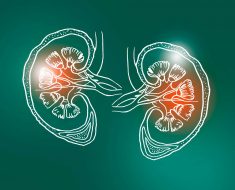
Recent findings published in The Lancet Global Health suggest that methods developed in high-income settings to check kidney function are not accurate for many people in Africa.
Researchers from the African Research on Kidney Disease (ARK) Consortium ran the study, which focused on more than 2,500 people in Malawi, South Africa and Uganda.
About the study
Testing how well kidneys function is essential to diagnosing kidney disease in individuals and predicting the burden of kidney disease in populations.
Glomerular filtration rate (GFR) is the most common way to assess kidney function and is a measure of how much blood the kidneys are filtering per minute.
Testing kidney function involves measuring how much creatinine or cystatin C is in a person’s blood.
Creatinine is a by-product of muscle breakdown while cystatin C is a protein made by cells in the body.
Healthy kidneys filter creatinine or cystatin C out of the blood and excrete these in urine.
A creatinine or cystatin C test thus measures how well kidneys are performing. High levels can be a sign that the kidneys are not functioning properly.
To study the most accurate way to measure kidney function in African populations, the ARK Consortium compared the widely used creatinine and cystatin C-based tests with a benchmark test called the iohexol measured glomerular filtration rate (mGFR).
Iohexol is an iodine-like dye used as a diagnostic contrast agent in CT scans.
The ARK researchers found that creatinine-based tests were inaccurate for predicting kidney disease in African populations.
‘Importing’ tests to Africa undermines accuracy
The creatinine-based test was shown to be inaccurate for predicting kidney disease and this may be because it does not account for unique biological characteristics in African populations.
For example, Africans can have lower creatinine levels due to inadequate nutrition (especially low protein ingestion), short stature and low muscle bulk. Creatinine may also be excreted differently in African populations.
“The equation that is used to test kidney function is wrong for 1.4 billion people—Africans,” says co-lead author of the study, Dr. June Fabian of the University of the Witwatersrand, Johannesburg (Wits University), South Africa. “Kidney disease can be debilitating and ultimately fatal if left untreated. Blood tests are useful to spot early signs of kidney problems—and can help identify people who would benefit from treatment.”
Kidney disease prevalence in Africa may be 1 in 8 not 1 in 30
ARK researchers used the results of their study, along with population data from Burkina Faso, Ghana, Kenya, Malawi, South Africa and Uganda, to estimate overall levels of kidney disease.
The results suggest that kidney disease prevalence may be substantially higher in Africa than previously thought, increasing from about 1 in 30 people to about 1 in 8 people.
“The results of our study show that it is critical to consider whether research into what we consider to be ‘normal’ blood tests applies to all parts of the world,” says senior author Dr. Laurie Tomlinson of the London School of Hygiene & Tropical Medicine (LSHTM). “We have shown that for people living in Africa, differences in factors such as childhood health and current nutrition mean that if we’re using equations developed in the US and Europe, we may not be accurately estimating the kidney function of people globally. The burden of kidney disease in Africa has been substantially underestimated and kidney disease has not received the public health focus it requires.”
Cystatin C test trumps creatinine—but it costs
Tests based on cystatin C worked better than creatinine as an indicator of poor kidney function—but the cystatin C testing is not widely used or available in Africa.
The cystatin C test, which would be more suitable in Africa, costs around R320 [US$19], significantly more expensive than the widely-used but less accurate creatinine, at just R67 [US$4].
“We know that cystatin C is better in Africa but relatively speaking it’s a no-go in resource poor settings,” says Fabian.
The findings of the ARK study suggest that switching from the creatinine test of kidney function to cystatin C would be preferable. Ensuring accessibility and enabling doctors to use them should be a priority for Africa, researchers say, and further research for alternative biomarkers is also vital.
Source: Read Full Article





